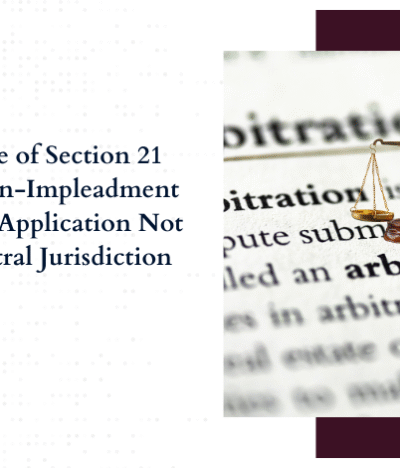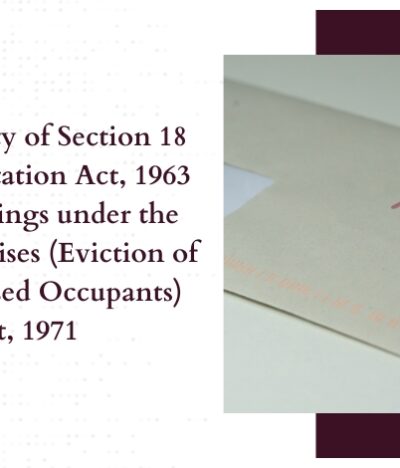In a landmark decision dated April 2, 2024, the High Court of Delhi underscored the principles of arbitration in the case of Prince Chadha v. Amardeep Singh. This pivotal judgment, presided over by Hon’ble Mr. Justice Prateek Jalan, elaborates on the limited role of courts in arbitration proceedings and the primacy of the arbitral tribunal in determining the arbitrability of disputes.
Facts of the Case
The case revolves around a disagreement concerning an Agreement to Sell dated January 2, 2008, which included a clause mandating arbitration for dispute resolution. Despite the clear terms of the agreement, the appointment of an arbitrator became contentious due to objections from the respondent, Amardeep Singh, who contested the existence of the arbitration agreement itself.
The petitioner, Prince Chadha, sought judicial intervention to appoint an arbitrator. This led to a nuanced exploration of the legal frameworks governing such appointments under Section 11 of the Arbitration and Conciliation Act, 1996.
Court’s Observation
Justice Prateek Jalan noted that the scope of court intervention is primarily to ascertain the prima facie existence of an arbitration agreement. He cited several precedents, such as Vidya Drolia v. Durga Trading Corporation, BSNL vs. Nortel Networks (India) (P) Ltd. [(2021) 5 SCC 738] and NTPC vs. SPML Infra Limited [(2023) 9 SCC 385], alongside a recent landmark ruling by a seven Judge Bench on December 13, 2023, in In Re: Interplay Between Arbitration Agreements under the Arbitration and Conciliation Act, 1996 and the Indian Stamp Act, 1899 [Curative Petition (C) No. 44/2023 and connected matters], underscoring a clear legal precedent, to affirm that substantive issues of arbitrability should be left to the arbitration tribunal, the forum chosen by the parties themselves.
In this context, Justice Jalan held that the court’s interference is warranted only when a dispute is ex-facie non-arbitrable, emphasizing that the existence of a signed and notarized agreement typically satisfies the requirement for the prima facie existence of an arbitration agreement.
By confirming the signatures of both parties on the disputed agreement, the court facilitated the arbitration process, thereby reinforcing the autonomy of the contractual obligations agreed upon by the parties.
Analysis by the Court
In his judgment, Hon’ble Mr. Justice Prateek Jalan meticulously analyzed the objections raised by the respondent. The primary objection was that no valid arbitration agreement existed, as the respondent denied having signed the agreement presented by the petitioner.
Justice Jalan addressed this contention by examining the physical evidence of the agreement. “The document bears the signatures of both parties and is attested by a Notary Public,” he observed, indicating a formal acknowledgement of the agreement’s validity at a prima facie level.
The court relied on established legal principles stating that “the final determination on the issue of arbitrability of the dispute and the subject matter should be made by the arbitrator.” This aligns with the judiciary’s consistent stance to minimize its involvement in arbitration disputes, upholding the principle that arbitration, as an alternative dispute resolution mechanism.
The judgment reiterated that the role of the judiciary under Section 11 of the Arbitration and Conciliation Act, 1996, is restricted to a prima facie review of the existence of an arbitration agreement.
By affirming the existence of the arbitration agreement, the court dismissed the respondent’s objections and facilitated the continuation of the arbitration process, thus upholding the integrity of contractual agreements and the efficacy of arbitration as outlined in the Act.
Court’s Decision
In delivering its verdict, the court reiterated the fundamental principle that its jurisdiction under Section 11 of the Arbitration and Conciliation Act is circumscribed to a prima facie assessment of the existence of the arbitration agreement.
The petition, filed by Prince Chadha, for the appointment of an arbitrator was granted, and the disputes arising from the Agreement to Sell dated 02.01.2008 were referred to arbitration. Mr. Vinay K. Gupta, a former Principal District & Sessions Judge, was appointed as the arbitrator. The arbitration proceedings were directed to be conducted under the rules of the Delhi International Arbitration Centre (DIAC).
The court’s decision to allow the arbitration to proceed underlines a critical legal doctrine: that arbitration should generally proceed if there is prima facie evidence of an agreement unless the dispute itself is non-arbitrable.
Conclusion
This case serves as a pivotal reference for future legal proceedings involving arbitration clauses and the role of courts in such contexts. The decision sets a precedent that strengthens the position of arbitration in contractual disputes, ensuring that parties’ decisions to choose arbitration are respected and enforced by the judiciary.
This judgment is a testament to the evolving landscape of arbitration in India, highlighting the judiciary’s role in facilitating dispute resolution while respecting the autonomy and intentions of the contracting parties. It reinforces the principle that courts should intervene in the arbitration process only when necessary, thereby promoting arbitration as a swift and effective method for resolving disputes.






